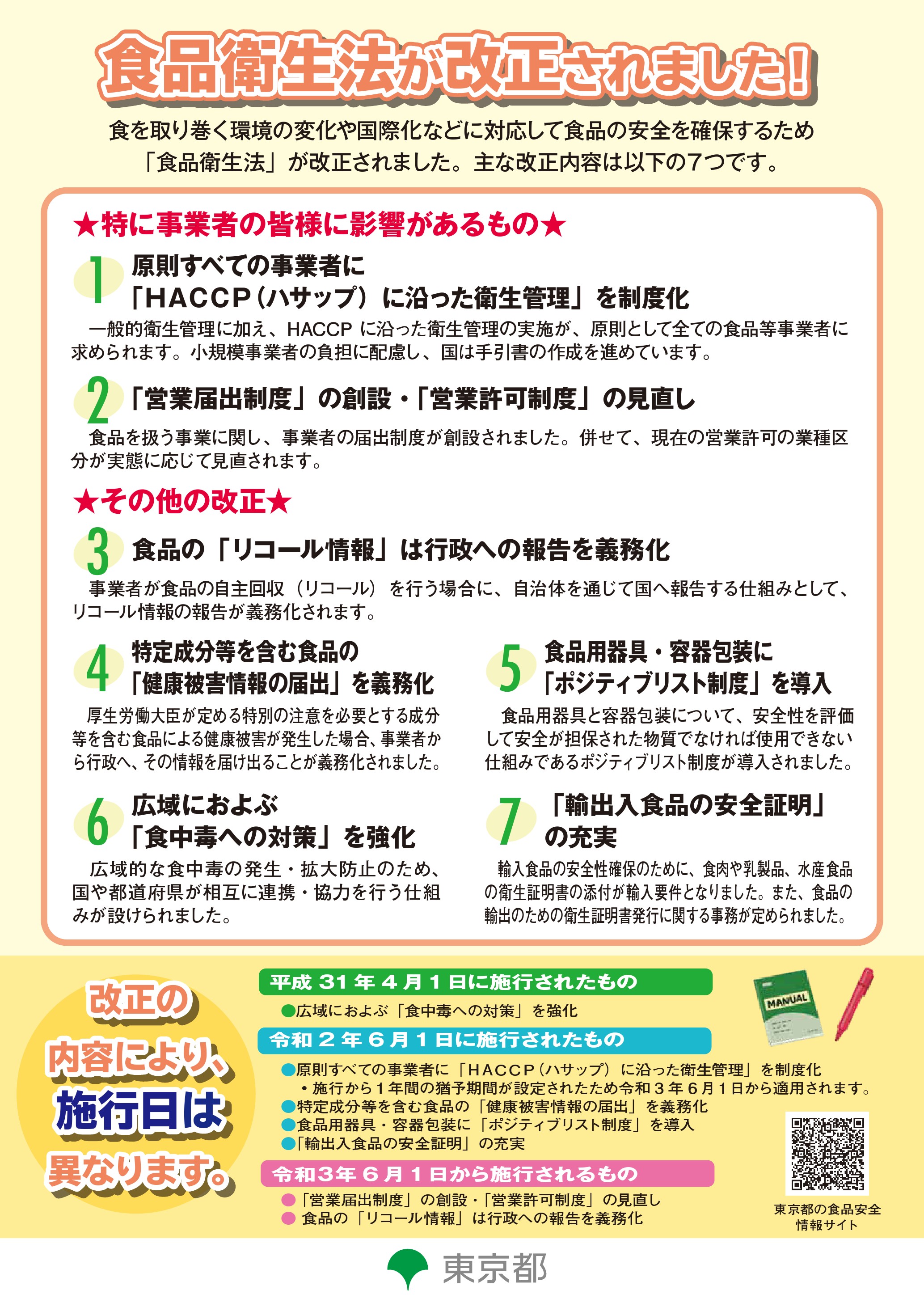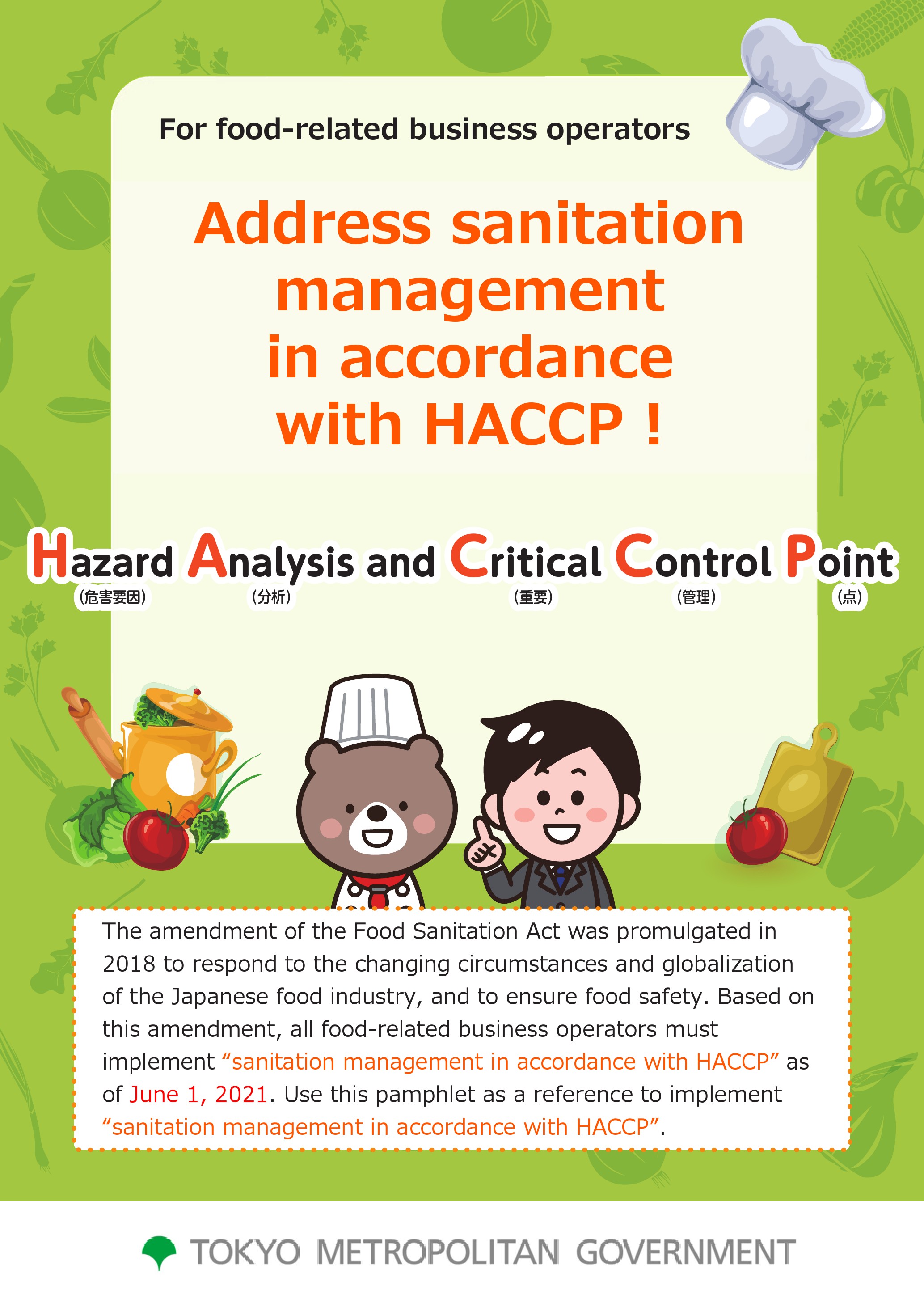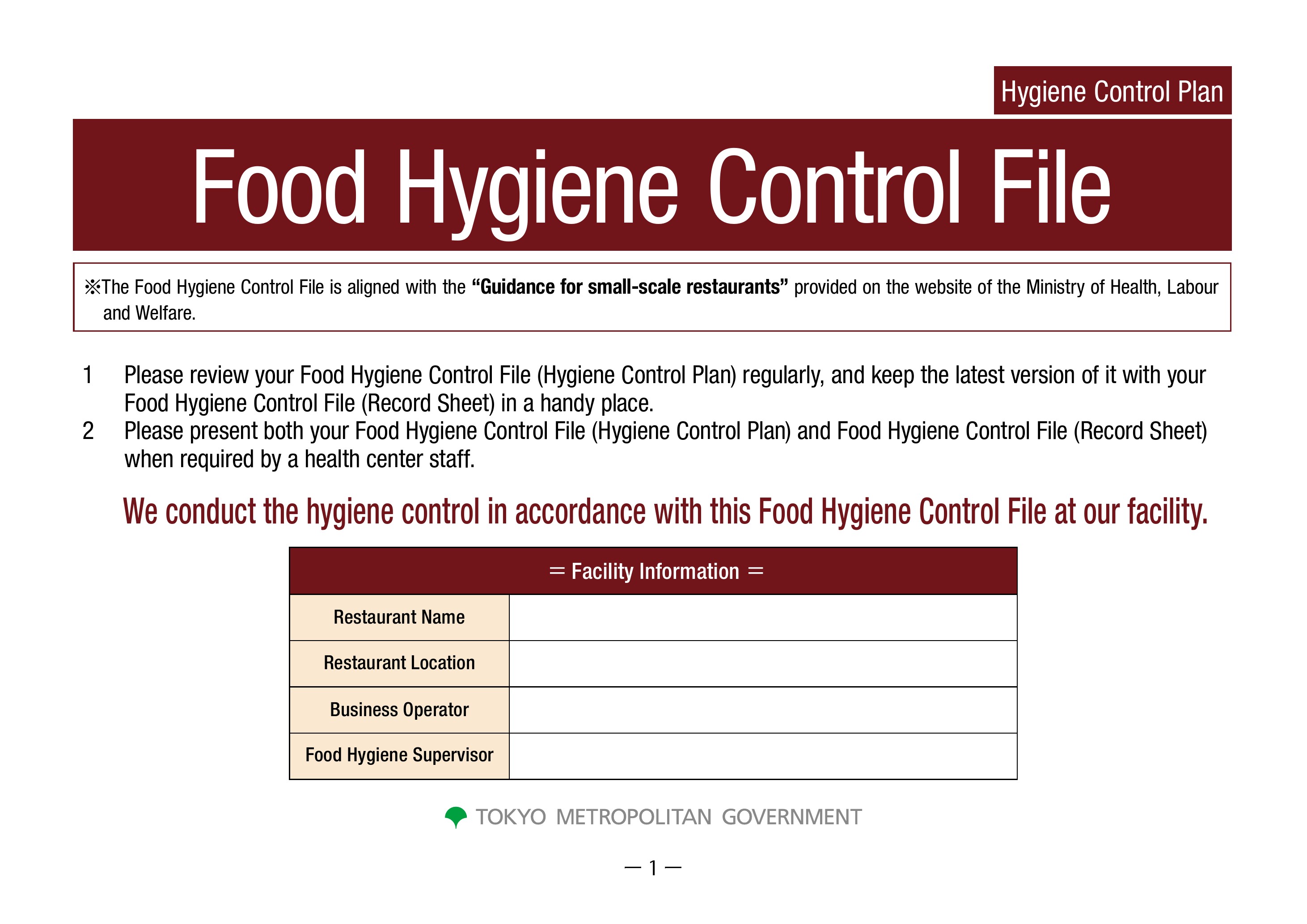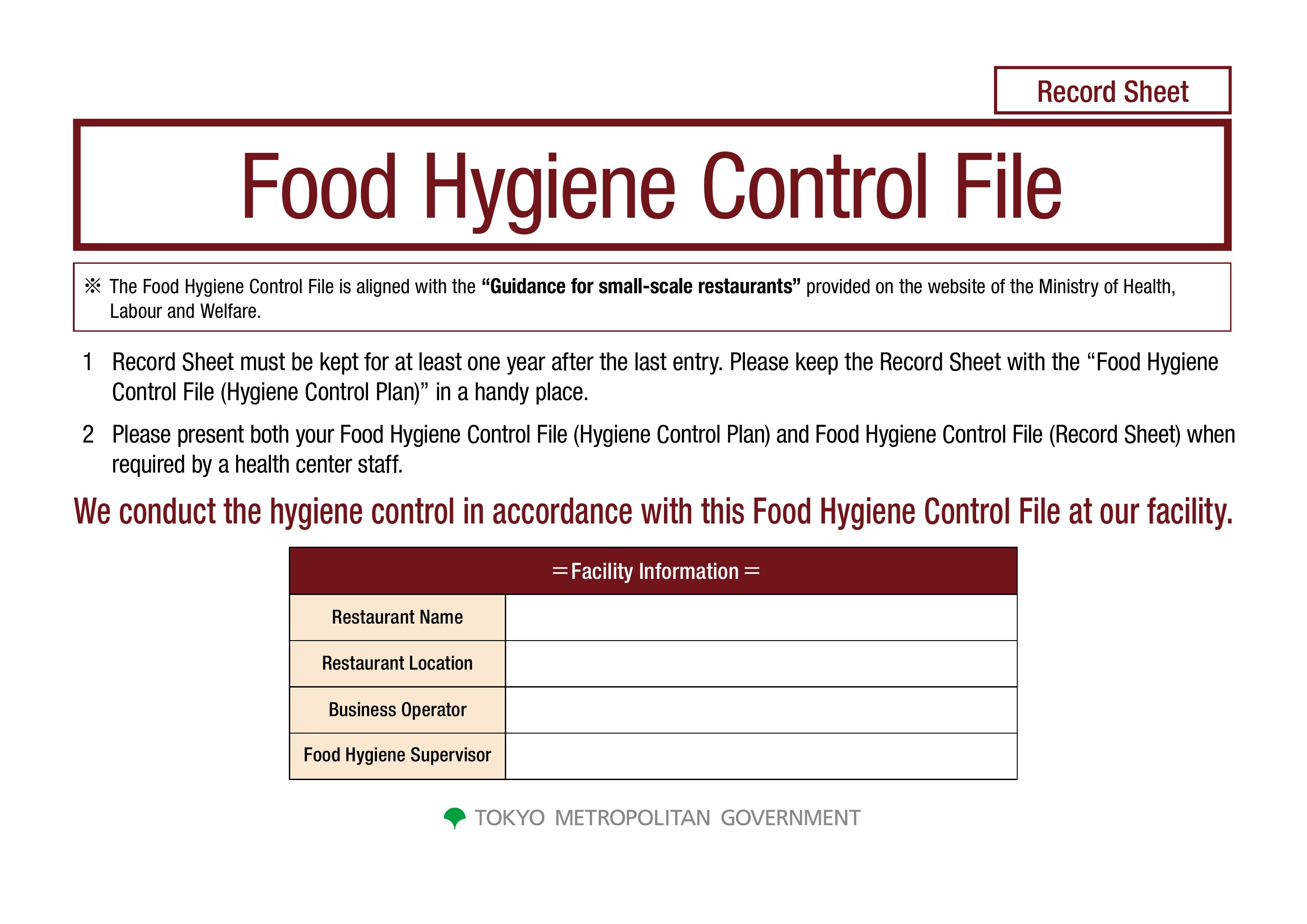Portal site for Food-related Business Operators » Amendment of the Food Sanitation Act » Institutionalization of Sanitation Management in Accordance with HACCP
Institutionalization of Sanitation Management in Accordance with HACCP
Institutionalization of Sanitation Management in Accordance with HACCP
Based on revision of the Food Sanitation Act, food sanitation management in accordance with HACCP has been institutionalized since June 1, 2021. This revision has made it necessary, in principle, for all food-related business operators to take measures based on the “Sanitation management in accordance with HACCP”.
If you have any questions, please contact your local health center.
What is required of business operators
Depending on the type of business and its size, food-related business operators must implement “sanitation management in accordance with HACCP” or “sanitation management incorporating the HACCP concept.”
Procedures that are common to the sanitation management styles are as follows. See each section for a description of procedures that differ according to business type and size.
- Prepare a sanitation management plan based on the standards of "general sanitation management" / "sanitation management in accordance with HACCP" and ensure the entire staff are made aware of it.
- If necessary, prepare procedures that specify specific methods for cleaning, washing, disinfection and handling of food.
- Prepare and keep records of implementations related to sanitation management.
- Effectiveness of the sanitation management plan and procedures shall be periodically verified (or when changes in process, etc., occur) and reviewed as required.
* Business operators who operate one of the following businesses must implement general sanitation management as a food-related business operator, but are not obligated to prepare a sanitation management plan and keep records of sanitation management practices.
- Import of food or additives
- Operation of business limited to transport or storage of food or additives (does not apply to cold storage warehousing)
- Sale of packaged foods that can be stored at room temperature for a long period of time without the risk of food sanitation due to due to decomposition or deterioration of quality
- Import or sale of food containers and packaging
Sanitation management based on HACCP
In accordance with Codex HACCP 7 Principles (*), food-related business operators create and manage plans according to the raw materials used and the manufacturing method themselves.
(Reference) Guide to Hygienic Management Based on HACCP
https://www.mhlw.go.jp/stf/seisakunitsuite/bunya/0000179028_00002.html (Japanese)
Target
- Slaughterhouse [slaughterhouse operators, slaughterhouse managers, slaughterhouse staff]
- Poultry slaughterhouse [Poultry slaughterhouse operators (does not apply to certified small scale poultry slaughterhouse operators)]
- Other businesses to be covered, taking into account the scale of the business operation and other factors
*HACCP requires 12 procedures; steps 6 through 12 are particularly important and are called "HACCP 7 Principles." See leaflet for details.
Sanitation management incorporating the HACCP concept
Sanitation management is implemented according to the characteristics of the food products handled or the size of the business based on general sanitation management in compliance with the “Guide” prepared by various trade associations and confirmed by the Ministry of Health, Labor and Welfare. A list of guide is published on the following website.
If there is no guide to refer to, you can consult with your local health center or refer to a guide for industries with common hazards involving similar raw materials and manufacturing processes.
Guide to sanitation management incorporating the HACCP concept
https://www.mhlw.go.jp/stf/seisakunitsuite/bunya/0000179028_00003.html (Japanese)
Target (Small Business Operators, etc.)
- Manufacturing, processing and/or cooking company devoted solely for retail sales at the relevant stores
- (For example: manufacture and sale of confectioneries, manufacture and sale of tofu, sale of meat, sale of seafood, etc.)
- Industries that offer many types of food and change production type frequently
- (For example: restaurant or coffee shop, side dish production business, bakery (consumption limit of approximately 5 days), group meal facilities other than schools/hospitals, including automatic vending machines with cooking functions)
- Business operators who store, transport or sell only food packaged in containers or wrapped with packages
- Business operators who engage in retail sale of food packaged in containers or wrapped with packages
- (For example: green grocer, rice store, retailer who sells coffee by weight)
- Small business operators (having staff of no more than 50 people involved in food handling)
- (Does not include persons who do not directly engage in the handling of food products such as clerical personnel.)
Leaflet
The information given above is also available in the following leaflet:
Leaflet "Food Sanitation Act has been revised!"
File (Japanese)(PDF:295KB)
(December 2020)

Brochure "Let's work on sanitation management in accordance
with HACCP!"
File (PDF:4.89MB)
(November 2020)

Food Hygiene Control File (Hygiene Control Plan and Record Sheet)
The Tokyo Metropolitan Government has created a "Food Hygiene Control Files" to assist sanitation management that incorporates HACCP concept at small eating and drinking establishments.Download it from the following link.
Underlying regulations, etc.
Please see the following for underlying regulations, etc.
- Article 50-2 of the Food Sanitation Act (Article 51 after June 1, 2021) (Japanese) (PDF: 105KB)
- Article 34-2 of the Order for Enforcement of the Food Sanitation Act (Japanese) (PDF: 115KB)
- Article 66-2, Article 66-3 and Article 66-4 of Ordinance for Enforcement of the Food Sanitation Act, Appendix 17 (General Sanitation Management) and Appendix 18 (Sanitation Management in Accordance with HACCP) (Japanese) (PDF: 402KB)
Related videos
Let’s try! The first step in HACCP!
A public awareness DVD has been prepared for food-related business operators. This video explains HACCP, a food sanitation management method, with simple terms and animations.
- Tokyo Metropolitan Government Official Video Channel
https://tokyodouga.jp/xl_vdy3ref0.html (Japanese) - YouTube
https://www.youtube.com/watch?v=Xl_vDY3REf0 (Japanese)
References
Materials for briefing sessions on governmental and ministerial ordinances based on the Ministry of Health, Labor and Welfare concerning “Partial Revision of the Food Sanitation Act" (at the bottom of the page)https://www.mhlw.go.jp/stf/seisakunitsuite/bunya/0000186645_00002.html (Japanese)

